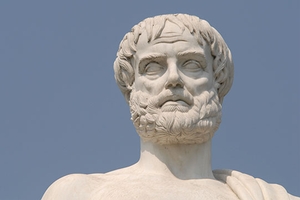Research
Three Perspectives of Chance: A Political Theory Institute Lecture by Robert Bartlett

American University School of Public Affairs (SPA) hosted Boston College's Behrakis Professor, Robert Bartlett for a talk examining the concept of "chance" and how it's viewed in political philosophy. Professor Bartlett, whose research focuses on classical political philosophy, looked at two philosophers', Aristotle and Niccolo Machivelli, conception of "chance," and how it is portrayed in the Bible. This talk was part of SPA's Political Theory Institute fall lecture series.
Bartlett said that Aristotle stresses that a "chance" event is one that might have actually occurred from intelligent chance or forethought.
"The world is full of acts that, because they are meaningless to us, are not named by us as being by chance," Aristotle says.
According to Aristotle, if the cosmos did come to be spontaneously or accidently, it still could have come to being for some purpose. Why should we be concerned with the concept of "chance"? Bartlett said it is because humans care about happiness. How we achieve happiness is questioned-is it divine intervention or chance?
"Aristotle says happiness is an activity of soul in accord with virtue," said Bartlett. "He says, to entrust the greatest and noblest thing, namely, happiness, to chance would be excessively harsh."
Bartlett also discussed the theological response and how religion offered a solution to the "problem of chance." Interpreters of the Bible link events to divine cause, and ascribe human actions to God. He quoted theologian John Calvin's description of fortune and chance as pagan terms that should not enter hearts of the faithful.
"We are open to the teaching of the Bible-or a comparable book-because the Bible teaches us either chance does not exist or, if it does, it does not ultimately determine our happiness," said Bartlett.
During this lecture, Bartlett explored the writings of political philosophers, especially Machiavelli.
"The guiding intention of modern philosophers was to destroy the moral and, especially, the political authority of the Bible. That was the target," said Bartlett. "Yet, I'll add that despite the problems that religion caused, it also offered very real comfort and solace to many."
Bartlett linked philosophical ideas related to controlling chance and managing risk in our daily lives-he mentioned examples such as the use of automatic brakes, insurance, and consumer-protection policies. He noted the irony that even as we live in an ever-more-planned world, it is not clear that we are happier or more satisfied than people in the past.
"The fact that our happiness is limited by chance, and ultimately by death, is a spur to all of us to reflect on the meaning of our lives and the character of the world we live in," said Thomas Merrill, SPA Associate Professor and a PTI faculty member.
